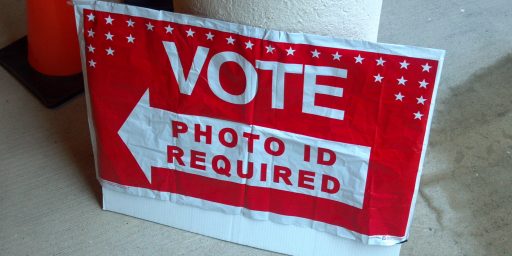Is Freakonomics Ruining Economics?
TNR’s Noam Scheiber weighs in with a longish essay entitled, “HOW FREAKONOMICS IS RUINING THE DISMAL SCIENCE.” (I’m not a subscriber, so can only read the first page.)
While it has virtually nothing to do with the topic at hand, this part of the intro struck me as odd:
That’s where Angrist and Krueger came in. In the paper, they pointed out that two features of the public school system allowed you to answer the question without all the uproar. First, most states force students to attend school until age 16. Second, for many decades, students started school the year they turned six. The upshot was that, if I were born in January and you were born in December of the same year, and we both dropped out at 16, then the rules forced you to stay in school almost one year longer. (We’d start school the same year, but I’d turn 16 midway through tenth grade and you’d hit 16 midway through eleventh.) The additional schooling foisted upon one group by this arbitrary state of affairs produced a scaled-down version of our experiment, allowing Angrist and Krueger to conclude that education did, in fact, help people earn more money.
But aren’t there studies showing that those who enter school “late” because of the birthday penalty do better because they’re more mature than their “early” entering counterparts?
At any rate, Scheiber’s argument is that the search for “clever” applications gave rise to a push toward the “what’s known as ‘clean identification’–a situation in which it’s easy to discern the causal forces in play” which in turn led the brightest minds of economics to focus on “parlor games” and eschewing research into “truly deep questions we rely on economists to answer.”
This was compounded, he believes, by the realization in the 1980s that economic analysis often wasn’t very much better than educated guesses, with wildly differing forecasts stemming from the same data and the inability to agree even on basic facts such as whether unionization leads to higher wages for workers. Ultimately, the wheels fell off completely:
Many young economists began shunning big questions altogether. Jim Heckman, a Nobel Prizewinning labor economist at the University of Chicago, illustrates the point with a story. A few years ago, he struck up a conversation with a promising assistant professor. Before long, Heckman began to gripe that economists lacked a comprehensive measure of all the obstacles a child might face in life–education, nutrition, family environment, and so on. There was no way to tell if childhood disadvantages were getting better or worse.
He encouraged the young economist to produce such a measure. “You’re absolutely right. It’s paramount, of first-order importance,” the woman replied. But there was zero chance she’d pursue it. “It would take years to do,” she explained apologetically. The woman had clearly made the right career decision: No one coming up for tenure could afford that kind of time while her colleagues published a stream of small-bore papers. On the other hand, says Heckman, “How long did it take Madame Curie to purify radium? Two or three years? If she was somehow told, like the grad students in our program, If you can’t solve the problem in a week or a month, drop it,’ a lot of big problems would have been dropped.”
Then again, purifying radium has the advantage that, once it’s done, it’s done.
Alex Tabarrok, who somehow managed to comment on the piece yesterday morning even though it’s dated today, believes Scheiber overstates the case and notes several economists using Freakonomics-style techniques to tackle truly important questions. Thus, “It’s possible to be clever and to think big.”
Perhaps more interesting is the economics of Economics:
The second problem is to think that if only people did less Freakonomics they would do more big think economics. If only it were so. The truth is that even today most of economics is a wasteland of boring papers on profoundly uninteresting questions. The choice is not Levitt v. Heckman it’s Levitt and Heckman (and many others like Buchanan who neither Levitt nor Heckman might appreciate) versus a huge number of non-entities (many highly paid and famous) who answer trivial questions poorly and do it without even the courtesy of offering some entertainment on the side.
Likely quite right. While it’s likely true that a tenure and promotion system that incentivizes doing studies that can be done quickly will divert some attention that might have gone to those which can not, there are, almost by definition, plenty of people interested in the “important” and “policy relevant” questions. Presumably, if academic economists aren’t doing them, think tanks and private foundations will.
Tabarrok’s Marginal Revolution colleague Tyler Cowen adds in the comments section:
I thought the article was a good summary of how Steve Levitt has *improved* the economics profession. The exercise is always a comparative one and I can assure you matters were once worse: too theoretical, too much game theory, and too little interest in the real world. That has all changed. At a bare minimum, the Freakonomics movement ensures that everyone understands incentives and that is not to be taken for granted. Levitt-style economics is contrasted with James Heckman but in reality the two movements have risen together, rather than one displacing the other.
If there is any problem in top economics graduate students, it is not excessive interest in the clever at the expense of substance. It is lack of interest period, lack of breadth, and excessive careerism. There is plenty of room in the profession, and in people’s brains, for a bit more Freakonomics.
One would think. Lots of good discussion in the succeeding comments as well.






In the past economists pretended to be scientists, and even if deep down they knew it was all an illusion, they still made a concerted effort to imitate the benchmark illusions of genuine scientific research. Today the charade all but gone — all that is left is the effort to crank out “research” (i.e. publications) at the fastest rate possible, now matter how laughable the result is as an imitation of real science. All shame has been utterly lost.